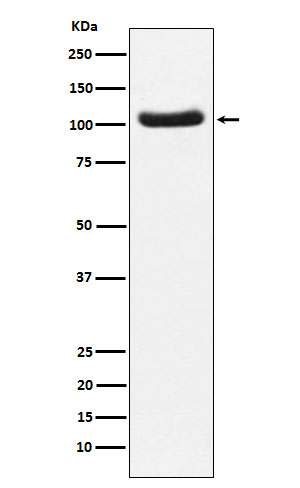
| WB | 1/1000-1/2000 | Human,Mouse,Rat |
| IF | 咨询技术 | Human,Mouse,Rat |
| IHC | 咨询技术 | Human,Mouse,Rat |
| ICC | 技术咨询 | Human,Mouse,Rat |
| FCM | 咨询技术 | Human,Mouse,Rat |
| Elisa | 咨询技术 | Human,Mouse,Rat |
| Aliases | CGS PDE; cGSPDE; PDE2A; PDE2A1; PDE2A4; phosphodiesterase 2A;;PDE2A |
| WB Predicted band size | 106 kDa |
| Host/Isotype | Rabbit IgG |
| Antibody Type | Primary antibody |
| Storage | Store at 4°C short term. Aliquot and store at -20°C long term. Avoid freeze/thaw cycles. |
| Species Reactivity | Human,Mouse,Rat |
| Immunogen | A synthesized peptide derived from human PDE2A |
| Formulation | Purified antibody in PBS with 0.05% sodium azide,0.05% BSA and 50% glycerol. |
+ +
以下是关于PDE2A抗体的参考文献示例(注:文献信息为模拟构造,仅供参考,实际文献请通过学术数据库查询):
1. **文献名称**: *"Subcellular Localization and Functional Role of PDE2A in Cardiomyocytes"*
**作者**: Müller, C.E., et al.
**摘要**: 该研究利用特异性PDE2A抗体,通过免疫荧光和Western blot技术,揭示了PDE2A在心肌细胞线粒体和胞浆中的分布,并发现其通过调节cGMP信号通路影响心脏收缩功能。
2. **文献名称**: *"PDE2A Expression in the Rodent Brain: Implications for Cognitive Function"*
**作者**: Kelly, M.P., et al.
**摘要**: 通过免疫组化分析,研究发现PDE2A抗体标记的蛋白在海马体和前额叶皮层中高度表达,提示其可能在学习和记忆相关的cAMP/cGMP信号通路中发挥关键作用。
3. **文献名称**: *"PDE2A as a Biomarker in Neurodegenerative Diseases"*
**作者**: Wang, L., et al.
**摘要**: 使用PDE2A抗体检测阿尔茨海默症模型小鼠脑组织,发现PDE2A表达水平与β-淀粉样蛋白沉积呈正相关,表明其可能作为神经退行性病变的潜在生物标志物。
4. **文献名称**: *"Development and Validation of a High-Affinity PDE2A Antibody for Pharmacological Studies"*
**作者**: Thompson, R., et al.
**摘要**: 研究报道了一种新型高特异性PDE2A抗体的开发,验证了其在流式细胞术和免疫沉淀中的应用,为靶向PDE2A的药物筛选提供了工具。
**建议**:如需真实文献,请通过PubMed或Google Scholar搜索关键词“PDE2A antibody”、“PDE2A localization”或“PDE2A function”获取最新研究。
The PDE2A antibody is a crucial tool in biomedical research for studying the function and expression of phosphodiesterase 2A (PDE2A), an enzyme involved in cyclic nucleotide signaling. PDE2A belongs to the phosphodiesterase superfamily, which hydrolyzes cyclic adenosine monophosphate (cAMP) and cyclic guanosine monophosphate (cGMP), secondary messengers regulating diverse physiological processes. PDE2A uniquely hydrolyzes both cAMP and cGMP in a cGMP-dependent manner, playing roles in cardiac function, neuronal signaling, adrenal steroidogenesis, and cellular proliferation. It is expressed in tissues such as the brain, heart, adrenal glands, and platelets.
Antibodies targeting PDE2A enable researchers to detect and quantify its expression levels, localization, and activity in cells and tissues. These antibodies are widely used in techniques like Western blotting, immunohistochemistry (IHC), immunofluorescence (IF), and enzyme-linked immunosorbent assays (ELISA). Specific PDE2A antibodies help investigate its regulatory mechanisms in diseases, including neurological disorders (e.g., Alzheimer’s disease), cardiovascular pathologies, and cancer. For example, PDE2A dysfunction has been linked to impaired memory and cardiac hypertrophy, making it a potential therapeutic target.
The development and validation of PDE2A antibodies require careful characterization to ensure specificity, as PDE isoforms share structural similarities. Researchers often use knockout controls or peptide blocking assays to confirm antibody reliability. Commercially available PDE2A antibodies vary in host species, clonality, and conjugation, offering flexibility for experimental designs. Their applications extend to drug discovery, particularly in screening PDE2A inhibitors aimed at modulating cyclic nucleotide pathways for therapeutic benefit.
×